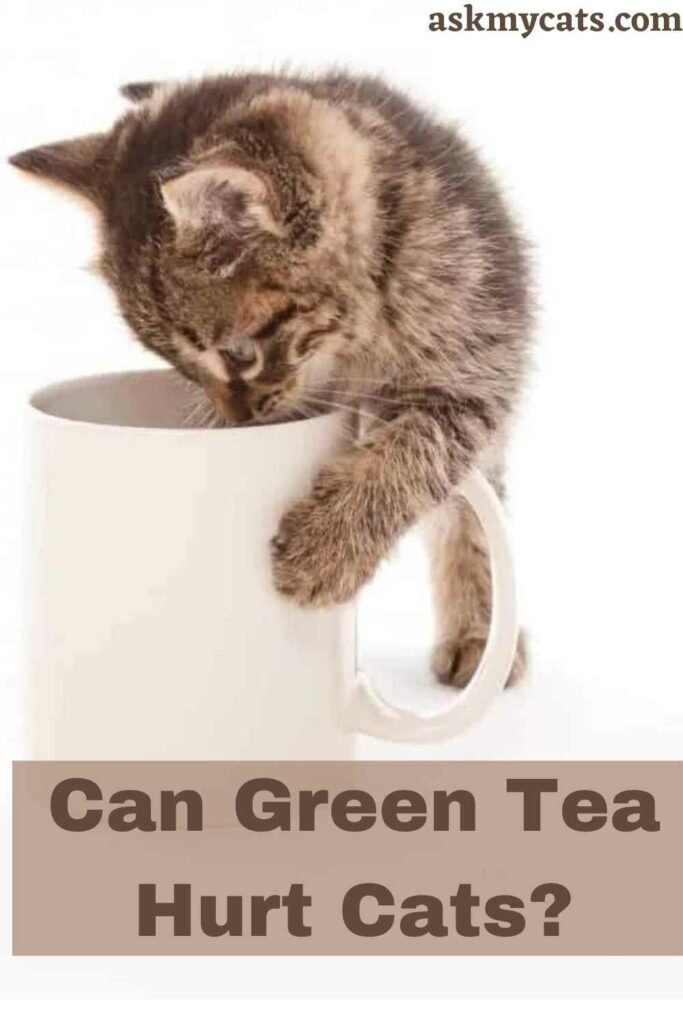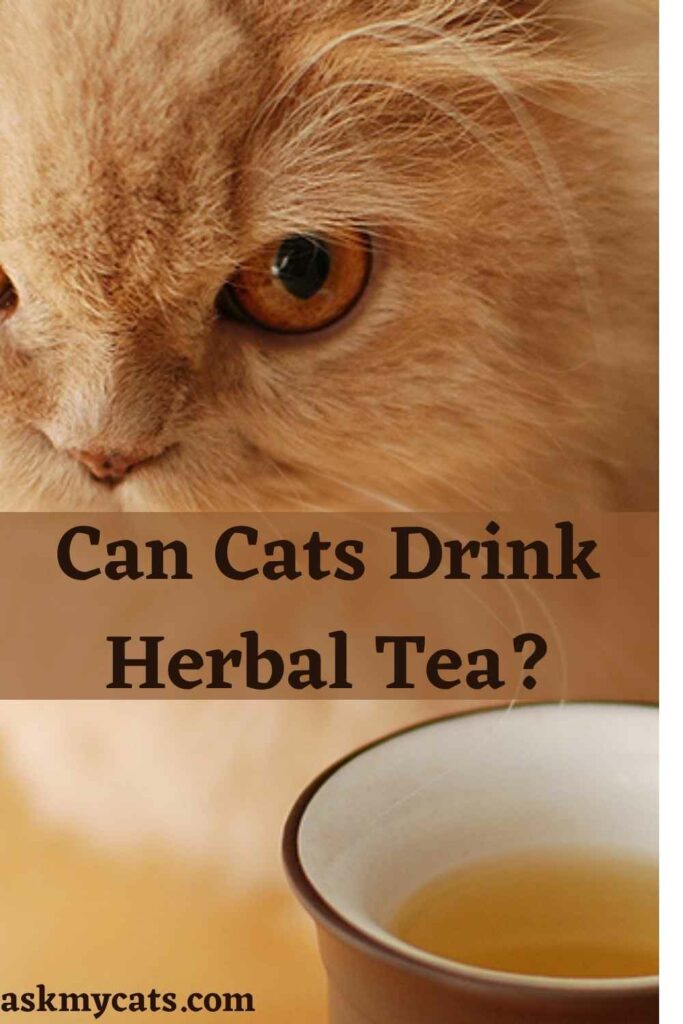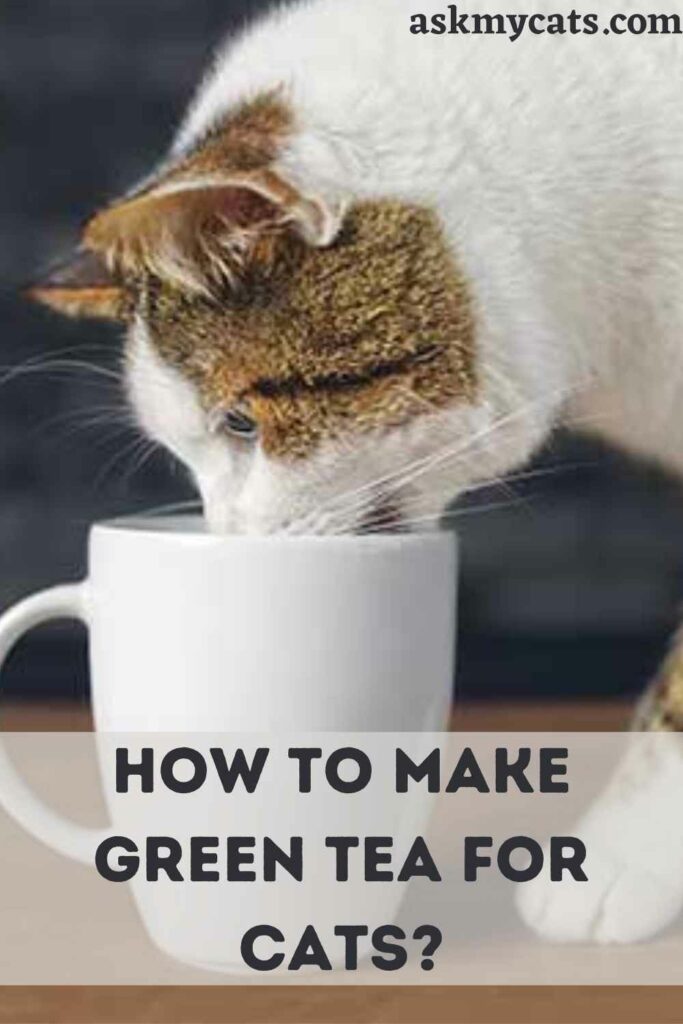We know that drinking green tea has numerous health benefits for humans, including weight loss, detoxification, alertness, and tranquility. Cat owners are wondering if their felines may partake in the green tea bliss.
We like to feed and nurture our furry pets to the best of our ability as cat parents or cat’s best friends since they bring us joy and comfort.
Catechins (the main polyphenol chemicals present in green tea) are antioxidants for humans; therefore, we assume the tea will be beneficial to cats as well. So, can cats drink green tea?
Yes, cats can drink green tea as it is safe to drink for cats as long as it is consumed in moderation due to the caffeine level. Green tea has a number of nutrients that can help cats live longer and be healthier.
Keep reading this article to know all the benefits of green tea to your cat and to feed it to them.


Give Your Cat the Perfect Day
Get the Free Ebook!
Is Green Tea Safe For Cats?
Yes, green tea is safe for cats if it is given in moderation.
Yes, cats can drink green tea, as bizarre as that may sound. Not only is it safe, but the components in what is often referred to as “one of the world’s healthiest drinks” can also benefit cats.
Your cat will benefit from it as long as it is caffeine-free and administered in moderation.
Epigallocatechin-3-gallate (or EGCG for short) is a type of polyphenol found in green tea that has been shown to reduce free radicals in the cat’s body significantly.
Surprisingly, this chemical molecule accounts for up to 45 percent of the catechins in green tea. This indicates that green tea is high in antioxidants, which aid in the natural removal of toxins, deposits, and waste from the body.
Polyphenols have also been proven to significantly boost the skin’s protection against UVB radiation, in addition to reducing tumor formation. They’re so effective that they can even kill cancer cells!
Can Green Tea Hurt Cats?
Yes, green tea can hurt cats if not fed in moderation because of its caffeine content.

Caffeine is a stimulant, but for little animals like cats, it’s simply too potent.
Caffeine can produce an increased heart rate, restlessness, vomiting, and hyperactivity, even in tiny amounts.
It can also trigger cardiac arrhythmias and elevate a cat’s blood pressure.
It is a highly hazardous toxin for them, and as cat owners, we must exercise extreme caution.
It’s not understood how much caffeine is harmful to cats or causes symptoms. It’s unlikely that drinking a cup of tea will be a problem.
However, like with any dangerous drug, it’s always best to err on the side of caution.
The good news is that green tea contains significantly less caffeine than other types of tea, such as black tea. You probably don’t need to be concerned if you’ve been giving your cat modest amounts of green tea by accident.
However, it still contains caffeine, and now that you’re aware of the dangers, you should only give your cat decaffeinated green tea.
The issue is that the quantity of caffeine in a cup of tea can vary by as much as 25-75 mg, depending on the brand and type of tea.
Furthermore, even decaffeinated tea often contains caffeine. The leaves are processed to eliminate the majority of the caffeine.
According to regulation, tea can be branded “decaffeinated” if it contains less than 2.5 percent of its original caffeine concentration.
It’s preferable to be safe rather than sorry. My recommendation is to purchase decaffeinated green tea and just give your cat a small amount on occasion.
Do Cats Like The Smell Of Green Tea?
Whether a cat will like the smell of green tea or not will totally depend upon the cat’s personality as green tea does not have a smell that attracts cats.
The green tea aroma is neither on the list of popular scents that cats despise nor on the list of scents that cats prefer.
Eating green tea ice cream or drinking green tea while your cat is around will reveal this. Try to check whether your cat is purring and walking about when you are eating it. If yes, then your cat likes the scent of green tea.
Is Green Tea Ice Cream Bad For Cats?
No, green tea ice cream is not bad for cats, but only if given in moderation as it has milk and sugar, and most cats are lactose intolerant.
Green tea cream isn’t hazardous to cats in general so they can consume a spoonful or two. However, because ice cream contains milk, your cat may have stomach trouble if it is lactose intolerant. If you want to share, keep the ice cream to a spoon, and don’t go over that.
Cats, on the other hand, lack the enzymes required to digest lactose. As a result, any lactose-containing product, such as ice cream, can be harmful to them. Furthermore, ice cream is far too sugary to cause long-term issues.
If your cat is lactose intolerant, eating green ice cream can cause an upset stomach or diarrhea. If your pet consumes a large amount of it, diarrhea may develop.
Another point to consider is the sweetener. Sugar, albeit the most common sweetener, is ineffective for cats. Sugar levels in your pet’s blood will only rise as a result of the sweetener.
It’s not healthy for cats to eat as many sugary goodies as people do. As a result, stay away from it as much as possible.
Another possibility is that green tea ice cream contains xylitol, which is toxic to cats. Sugar-free products frequently contain xylitol. It acts as a sugar substitute, and while it is safe for humans, it is not safe for our cats.
Can Cats Drink Herbal Tea?
Whether cats can drink herbal tea or not depends on the herbal tea ingredients, as some are safe while others can have serious implications.

Some types of “tea” are actually herbal infusions that don’t include any tea at all.
This is significant since different plants have various effects.
Some are pretty safe, while others might cause serious health problems for your cat.
The word “chamomile” can refer to a wide range of safe and harmful species; therefore, chamomile tea is a popular offender.
German chamomile (Matricaria chamomilla) is safe for cats and provides a number of health benefits.
Unfortunately, many chamomile teas contain many chamomile types.
Roman chamomile is one among them (Chamaemelum Nobile). This herb has a similar appearance and qualities in people.
However, it has very different and considerably more harmful consequences on cats. It’s better to keep any form of chamomile tea away from your cats unless you know exactly which herb you’re dealing with.
St John’s Wort is a potent herb that can be consumed as an infusion. While it has numerous benefits for humans, it can be pretty hazardous to cats. (It’s also not a good idea for humans to drink if they’re taking any medications.)
Mint tea is another popular herbal drink for humans. While peppermint and spearmint teas can help with dyspepsia in humans, they can also disturb a cat’s digestive.
Lavender is a lovely, aromatic plant for your tea, but it’s not suitable for your cat. Fortunately, a cat would have to drink a lot of lavender tea before being unwell.
Unfortunately, there are lots of cats who are adamant about drinking whatever you’re drinking, even if it makes them sick in the process.
On the other hand, there are a number of herbs that are safe and even good for cats. You can make kitten “teas” with many of these.
You might do this for a variety of reasons. One option is to cure mild ailments with your veterinarian’s approval. Another option is to just urge your cat to drink more water. Cats have a dreadful propensity to being chronically dehydrated.
Of course, you should let any infusions you make for your cat cool before putting them in her bowl. Cats’ sensitive mouths and nostrils are easily scalded.
Because herbal infusions might leave a residue, use a separate bowl from the one, you usually use for her water. She might not want to utilize a dish if she doesn’t enjoy the taste or scent.
Catnip, commonly known as catmint, is an excellent herb for calming frightened cats and improving their mood.
Cats can go on a “trip” when they roll about and play like kittens if they consume enough of it. Making a catnip infusion might help an anxious feline relax or encourage a thirsty cat to drink.
You are free to give your cat Valerian tea. This herb is known for its strong odor; a friend of mine refers to it as the “stinky feet” herb. It’s also used as a human relaxant and sleep aid.
Valerian, on the other hand, has the opposite impact on cats. It works as a mild stimulant, encouraging them to get up and move around. This is fantastic if you have a couch potato who desperately needs to get some exercise.
Licorice root tea is a beneficial herb for cats who have a nervous stomach. Licorice root infusions assist in easing their stomachs and may also have a calming effect on some cats.
How To Make Green Tea For Cats?
You can make green tea for cats by: –

- Pour 1 liter of cold water into a glass pitcher. (It is recommended glass rather than plastic to prevent PVC contaminations).
- Insert 1 tea bag (organic, pure green tea is preferred) or 1 tablespoon of loose leaves. You can use Jasmine Green Tea or plain Green Tea, or Sencha Green tea. There are many varieties of green tea.
- Cats usually like fresh, non-roasted green tea better than roasted. However, each cat is unique, and therefore, it is worth it to try a variety to see what your cat prefers.
- Use cold water as less caffeine is transferred to cold water compared to hot. It is not necessary to use decaffeinated green tea if cold water is used to brew the tea.
- Another option is to use the tea bag after it has been used to make tea for yourself. It will still have enough strength to then brew 1 liter in cold water for your pets.
- Steep for 15 minutes.
- Remove tea bag
- Store in the glass pitcher (covered) in the fridge. It stays fresh for 3 days.
- Most cats will drink the green tea if put in a glass bowl or even a drinking glass.
- Always offer plain water in case the cat prefers that over the green tea. Cats must always consume enough water and have access to it.
- For small cats, you can also mix 1/8 of a cup twice daily into food.
- For medium cats, you can mix ½ cup twice daily into food.
- For large cats, you can mix 1 cup twice daily into food.
Frequently Asked Questions
What are the benefits of cats drinking green tea?
Green tea for cats may have advantages that will benefit them in the long run. Aiding in the resistance of feline diabetes, Improving muscle bones and structure, Reducing the danger of cardiovascular disease, Boosting metabolism, and Lowering blood pressure levels are only a few of the advantages. These advantages of green tea for cats are only a small part of how it can help your cat live a longer life.
What are the drawbacks of cats drinking green tea?
The biggest drawback of green tea is that it contains caffeine that can lead to cats having accelerated or labored breathing, Heart palpitations, Anxiety, Behavioural Changes, Tremors, and Seizures.
Can cats drink flavored green tea?
Yes, cats can drink flavored green tea. Try to ensure the green tea you choose is organic, and non-GMO and that any added flavors come from natural dried fruit and herbs – or from the fruit you steep with the tea yourself. There is no reason for your cat to ingest artificial flavors.
Final Words
Not all cats will like the taste, but a little bowl of room temperature green tea once a day would be enough for those who do. Some cats will only drink a small quantity before moving on, while others will consume the entire bowl.
If your cat isn’t a fan, but you still want them to benefit, add 1 or 2 tablespoons to their diet once or twice a day. Green tea with natural caffeine is what you’ll get if you use ordinary green tea. It’s preferable to keep this to a minimum.
You won’t have to worry about them drinking too much if you get decaffeinated green tea.
If you have any other questions, feel free to ask us in the comments section.
Interesting Read: Do Used Tea Bags Keep Cats Away?
